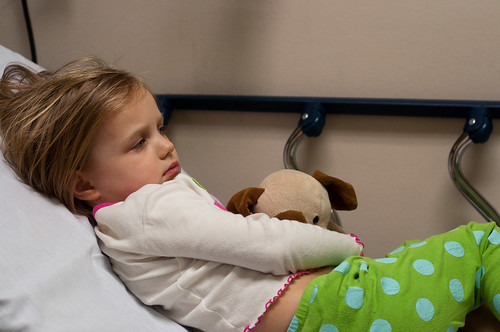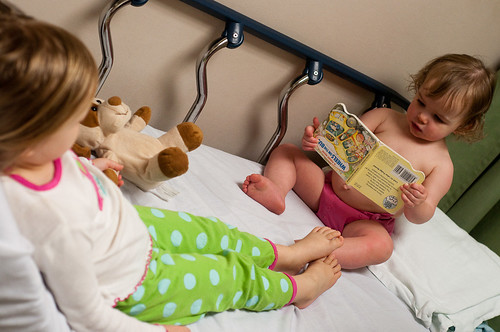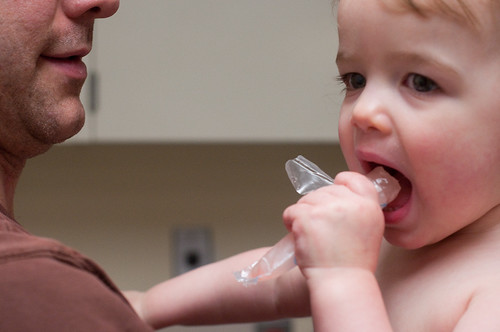1) The allergist made us feel better by assuring us that we were understandably confused in the heat of the moment (and afterwards), because this was not a "typical" reaction.
2) She was not surprised by how the hospital treated us and thinks we likely would've gotten the same treatment at most area hospitals. As she put it, in her experience, if you do not have hives, they simply have a hard time believing that you are having an allergic reaction. (Never mind the fact that all literature on the subject indicates that hives need not be present; I think it's just a case of lack of familiarity and E.R. docs having to rely on knowledge of the most typical cases, not to mention juggling all manner of various maladies on any given night.)
3) After Georgia initially recovered from the reaction, we should have continued giving her Benadryl every 4-6 hours for the next 24 hours to make sure that everything stayed under control and that a biphasic reaction did not occur. So, we blew that one! (As did the hospital.) Joe did, however, end up sleeping in the same bed with Georgia that night, just to put our minds at ease, so I don't feel too bad about our flub.
4) Had we spoken to the allergist about 20 minutes earlier, while Georgia was still vomiting in rapid succession, the allergist likely would've advised that we inject the Epipen. She said that is what she usually recommends when internal symptoms (like vomiting, or swelling of the tongue) are occurring. She prefers to err on the side of caution and says it would never be "wrong" to use the Epipen, because it will not hurt Georgia. In this particular case, she said it would have stopped the vomiting and made her feel better. However, by the time we spoke to the allergist in the midst of dealing with this reaction, Georgia had at least temporarily stopped vomiting and had fallen asleep in the car, plus we were not far from a hospital, which is why the allergist did not advise us to inject the Epipen.
It's all so weird, isn't it? I mean, once you have the benefit of hindsight and knowing that everything turned out JUST FINE, it sounds ridiculous to have considered injecting the Epipen, because that's just a much more dramatic thing to do. For starters, it would mean immediately calling 9-1-1, arriving in an ambulance, and likely staying overnight in the hospital. Not to mention the fact that it would probably totally freak Georgia out (which I'm all for if it means saving her life, but generally against if it's not necessary).
But the problem is, you don't know until afterwards that, yeah, things will turn out just fine without the Epipen, and if you need it and wait, it can be too late! Which is why the allergist says when in doubt, use it.
I just feel funny knowing that there have now been two reactions where maybe we should've used the Epipen but didn't. (And then at the same time, with the benefit of hindsight and knowing that she recovered fully without the Epipen, there's a part of me that's glad we didn't inject the Epipen. Is that bad?) I am certainly not trying to take chances with her health in these situations, I'm just saying we've gotten very lucky in the past, but this is all a good reminder that one cannot count on "luck" during future allergic reactions. In short, better safe than sorry.
5) Does it even matter if it was anaphylaxis? What is the point of labeling the type of reaction? I don't know. To us it was just a point of curiosity, wanting to understand Georgia's allergies better, wanting to know if we should've used the Epipen, and wanting to know how "serious" her reaction was. (Also, we were confused by the list of "types of reactions" on FAAN's website, trying to fit Georgia's experience into one of their categories.) The response from the allergist was that, again, this was a confusing, atypical reaction, and we may have hit on a gray area where even she can't fully describe the reaction. It was not "just hives" because it included internal symptoms and no hives. She said certainly it had "anaphylactic potential" if it was not actual anaphylaxis. If her blood pressure had dropped, then it would be deemed anaphylaxis without question. But Georgia's blood pressure measured just fine by the time we were at the hospital. Could a BP drop be what caused her to so easily fall asleep on the couch or to pass out asleep in the car on the way to the hospital? I hope not but guess we'll never know. So if I understand it right, hives alone would not be anaphylactic, hives + vomiting would be anaphylactic, vomiting + blood pressure drop (or just about any symptom + blood pressure drop) would be anaphylacitc, but vomiting without the blood pressure drop = not anaphylactcic probabaly, but "anaphylactic potential." (Whew! What a mess! And maybe it doesn't even matter from a practical standpoint, but I thought I'd share, for what it's worth.)
So, there you go. We've learned a lot, but I'm also amazed at how unclear all this allergy stuff is to me. I mean, I don't consider myself to be on the uneducated end of the spectrum. I write a blog about food allergies (albeit mostly about personal experiences, not research) and read about them frequently. And yet navigating food choices everyday, and handling a reaction when it happens still feels much more like an art than a science to me. It's all just a collection of individual choices guided by medical advice, but not clearly black and white.




